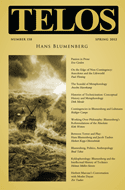Kirk Wetters’s “Working Over Philosophy: Hans Blumenberg’s Reformulations of the Absolute” appears in Telos 158 (Spring 2012). Read the full version online at the TELOS Online website, or purchase a print copy of the issue here.
 This essay underscores Blumenberg’s braking effect with respect to the sheer continuation of preexisting philosophical and theoretical traditions. Wetters sees Blumenberg’s metaphorology as a meta-reflection that produces interference within the modes through which philosophical and theoretical works traditionally produce their operative and authoritative effects. A major impetus of Blumenberg’s method is the anti-authoritarian de-classicization of traditions that, virtually by definition, are instrumentalized and homogenized as soon they are made into the vehicles for “claims” (Behauptungen) and theoretical “self-assertions” (Selbstbehauptungen). Wetters argues that, beyond Blumenberg’s own claims, the specificity of his work depends on deeply embedded nuances and details of the argumentation that are not easily detachable from their immediate context. Narration emerges as the key source of the power of both myth and philosophy. For Wetters, narrative choices reflect the relation to power, and philosophy becomes inseparable from myth whenever it attempts to narrate its own story or history. Blumenberg is extraordinarily sensitive to the effects not only of others’ implicit narratives and motives but also of his own. Wetters thus hypothesizes that this sensitivity may explain and justify the increasingly literary style of Blumenberg’s works.
This essay underscores Blumenberg’s braking effect with respect to the sheer continuation of preexisting philosophical and theoretical traditions. Wetters sees Blumenberg’s metaphorology as a meta-reflection that produces interference within the modes through which philosophical and theoretical works traditionally produce their operative and authoritative effects. A major impetus of Blumenberg’s method is the anti-authoritarian de-classicization of traditions that, virtually by definition, are instrumentalized and homogenized as soon they are made into the vehicles for “claims” (Behauptungen) and theoretical “self-assertions” (Selbstbehauptungen). Wetters argues that, beyond Blumenberg’s own claims, the specificity of his work depends on deeply embedded nuances and details of the argumentation that are not easily detachable from their immediate context. Narration emerges as the key source of the power of both myth and philosophy. For Wetters, narrative choices reflect the relation to power, and philosophy becomes inseparable from myth whenever it attempts to narrate its own story or history. Blumenberg is extraordinarily sensitive to the effects not only of others’ implicit narratives and motives but also of his own. Wetters thus hypothesizes that this sensitivity may explain and justify the increasingly literary style of Blumenberg’s works.







